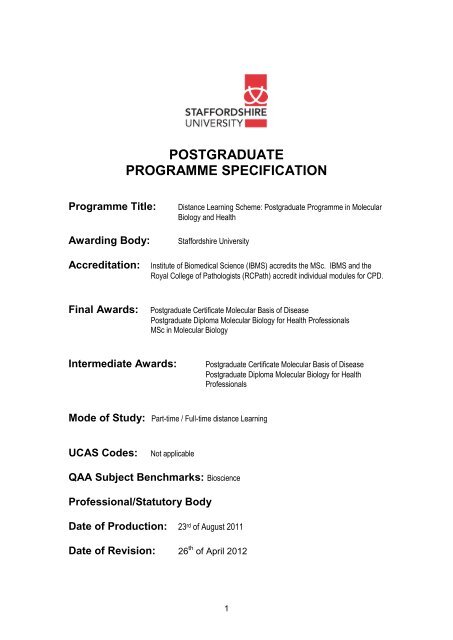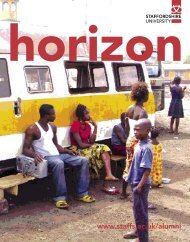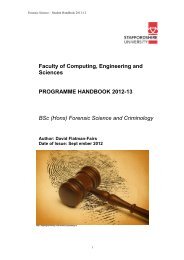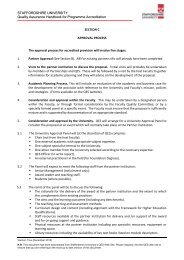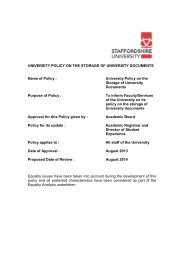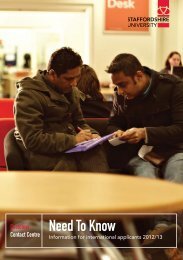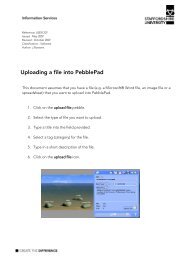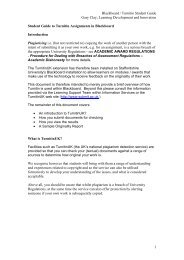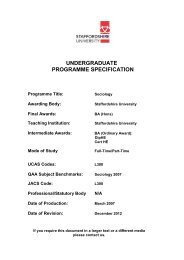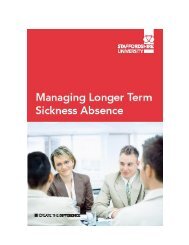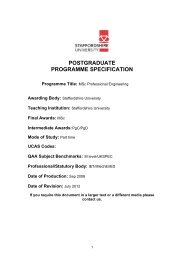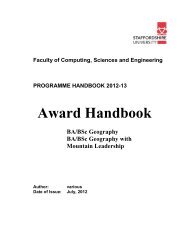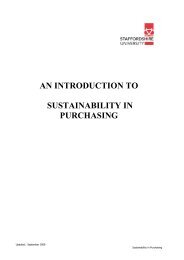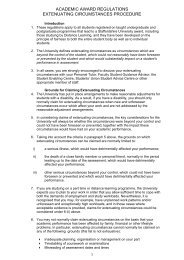MSc Molecular Biology Programme Specification - Staffordshire ...
MSc Molecular Biology Programme Specification - Staffordshire ...
MSc Molecular Biology Programme Specification - Staffordshire ...
Create successful ePaper yourself
Turn your PDF publications into a flip-book with our unique Google optimized e-Paper software.
POSTGRADUATE<br />
PROGRAMME SPECIFICATION<br />
<strong>Programme</strong> Title:<br />
Awarding Body:<br />
Distance Learning Scheme: Postgraduate <strong>Programme</strong> in <strong>Molecular</strong><br />
<strong>Biology</strong> and Health<br />
<strong>Staffordshire</strong> University<br />
Accreditation: Institute of Biomedical Science (IBMS) accredits the <strong>MSc</strong>. IBMS and the<br />
Royal College of Pathologists (RCPath) accredit individual modules for CPD.<br />
Final Awards:<br />
Postgraduate Certificate <strong>Molecular</strong> Basis of Disease<br />
Postgraduate Diploma <strong>Molecular</strong> <strong>Biology</strong> for Health Professionals<br />
<strong>MSc</strong> in <strong>Molecular</strong> <strong>Biology</strong><br />
Intermediate Awards:<br />
Postgraduate Certificate <strong>Molecular</strong> Basis of Disease<br />
Postgraduate Diploma <strong>Molecular</strong> <strong>Biology</strong> for Health<br />
Professionals<br />
Mode of Study: Part-time / Full-time distance Learning<br />
UCAS Codes:<br />
Not applicable<br />
QAA Subject Benchmarks: Bioscience<br />
Professional/Statutory Body<br />
Date of Production: 23 rd of August 2011<br />
Date of Revision: 26 th of April 2012<br />
1
If you require this document in a larger text or a different media please<br />
contact us.<br />
2
EDUCATIONAL AIMS OF THE PROGRAMME<br />
Our postgraduate programme in molecular biology aims to provide you with an opportunity to acquire<br />
knowledge and understanding of molecular biology and its impact on biomedicine. The emphasis of the<br />
programme lies in your acquisition of central theory (Certificate and Diploma) which you can then apply<br />
in practice (Diploma and Masters).<br />
A postgraduate approach to both the acquisition and development of many key transferable skills and<br />
knowledge is underpinned by a supportive teaching and learning strategies via online learning blended<br />
with campus-based practical courses.<br />
The aims are<br />
to offer you advanced courses, reflecting contemporary research, at postgraduate level, in the<br />
theory and practice of molecular biology with special emphasis on biomedical applications<br />
to develop your knowledge and highly valued key practical and analytical skills (for the Diploma<br />
and Masters awards) to maintain and enhance your employability and prospects.<br />
to provide flexible study options geared to your work and lifestyle commitments<br />
to enhance your abilities in critical awareness and thinking, analysis and reflection, selfreliance<br />
and confidence, communication, adaptability, creativity, team working and<br />
management skills.<br />
To provide you with a positive learning experience.<br />
What is distinctive about this programme?<br />
The emphasis on health related aspects of <strong>Molecular</strong> <strong>Biology</strong> gives the courses a vocational<br />
orientation without becoming too specialised as to omit broader aspects. The <strong>MSc</strong> is<br />
accredited and its content has been informed by the IBMS.<br />
There are very few <strong>Molecular</strong> <strong>Biology</strong> <strong>MSc</strong>’s which are predominantly by distance learning.<br />
The awards are attractive if you are in employment within the UK or abroad.<br />
On the Diploma and <strong>MSc</strong> are the opportunities for you to develop and expand your key<br />
practical skills, valued by employers, in our well equipped, up-to-date laboratories.<br />
Development of a wider range of skills of value to employers, independent and group working,<br />
presentations, time management and project planning.<br />
Available full- or part-time.<br />
Two entry points, September and February.<br />
Part-time routes are very flexible and so attractive if you are in full –time employment.<br />
The final year project can, by negotiation, be carried out at your place of work.<br />
3
PROGRAMME OUTCOMES<br />
Postgraduate Certificate in the <strong>Molecular</strong> Basis of Disease<br />
This programme of study serves as a foundation for learning. It allows you to consolidate, deepen and<br />
broaden your professional knowledge base and skills through the processes of critical reflection and<br />
analysis. At the end of this period of learning, you will be able to:<br />
1. Demonstrate through the accurate interpretation of information, understanding and knowledge of<br />
the central tenets of molecular biology and their relevance and application to medicine. (SU:<br />
Knowledge & Understanding, Learning, Problem Solving, Communication.)<br />
2. Engage in critical reflection and analysis of current biomedical applications of molecular biology<br />
and critically appraise different methods of research. (SU: Knowledge & Understanding, Enquiry,<br />
Analysis, Reflection)<br />
3. Determine the application of knowledge and skills to the analysis and solutions of issues<br />
associated with your area of practice. (SU Analysis, Application)<br />
Postgraduate Diploma in <strong>Molecular</strong> <strong>Biology</strong> for Health Professionals<br />
This stage of the programme allows for critical inquiry, synthesis and evaluation of a higher level of<br />
knowledge and skills. You will develop advanced skills and critique and apply advanced knowledge,<br />
evidence and skills to practice. In addition to the outcomes achieved at Certificate level, above, at the<br />
end of this period of learning, you will be able to:<br />
4. Undertake independent study at an advanced level and further develop the ability to identify, initiate and<br />
integrate new approaches to your area of practice. (SU: Learning, Enquiry).<br />
5. Demonstrate the ability to articulate complex and abstract ideas and arguments and engage peers in the<br />
consideration of them. (SU: Learning, Communication).<br />
6. Be competent and confident in the execution of molecular techniques and protocols within biomedicine<br />
(SU: practical skills, enquiry, problem solving analysis).<br />
7. Apply knowledge and advanced practical skills to the design of appropriate strategies for the<br />
experimental analysis of issues associated with your area of practice. (SU Analysis, Application,<br />
Problem Solving).<br />
8. Critically examine evidence from a variety of practical and theoretical perspectives in order<br />
to determine the implications for future research and practice development. (SU: Enquiry,<br />
Analysis, Application).<br />
Masters in <strong>Molecular</strong> <strong>Biology</strong><br />
To qualify for the Masters award you will undertake an inquiry into practice that includes an element of<br />
empirical research. In addition to the outcomes achieved at Diploma level, above, at the end of this<br />
period of learning you will be able to:<br />
9. Demonstrate the ability to pursue a research topic from project definition through planning, execution,<br />
interpretation and analysis of data to complete dissertation. (SU: Learning, Enquiry, Application,<br />
Practical skills)<br />
10. Recognise and select appropriate strategies to communicate the findings of research and enquiry to<br />
peers. (SU: Communication)<br />
4
PROGRAMME STRUCTURE, MODULES AND CREDITS<br />
The postgraduate programme in molecular biology will comprise level 7 credits as shown within the<br />
designated routes as shown below:<br />
Outline of programme structure<br />
Postgraduate<br />
Certificate<br />
<strong>Molecular</strong> Basis<br />
of Disease (PgC)<br />
Postgraduate Diploma<br />
<strong>Molecular</strong> <strong>Biology</strong> for<br />
Health Professionals<br />
(PgD)<br />
All of PgC modules, 60<br />
credits<br />
PLUS<br />
Masters<br />
<strong>Molecular</strong><br />
<strong>Biology</strong> (<strong>MSc</strong>)<br />
All of PgD<br />
modules, 120<br />
credits<br />
PLUS<br />
Block 1:<br />
September -<br />
November<br />
Block 2:<br />
December -<br />
February<br />
Block 3:<br />
February -<br />
April-<br />
Principles of <strong>Molecular</strong><br />
<strong>Biology</strong> (15 credits)<br />
(or <strong>Molecular</strong> aspects<br />
of infectious disease if<br />
February start)<br />
<strong>Molecular</strong> aspects of<br />
chronic multi-factorial<br />
diseases (15 credits)<br />
<strong>Molecular</strong> aspects of<br />
infectious disease (15<br />
credits)<br />
(or Principles of<br />
<strong>Molecular</strong> <strong>Biology</strong> if<br />
February start)<br />
Genomics and Bioinformatics<br />
(15 credits)<br />
DNA Techniques (15 credits)<br />
Option module – one from<br />
●Negotiated Learning<br />
Module (15 credits)<br />
●Introduction to Leadership<br />
and Management (15 credits)<br />
<strong>MSc</strong> <strong>Molecular</strong> <strong>Biology</strong><br />
Project (60 credits)<br />
●Current Developments in<br />
Genetics (15 credits)<br />
Block 4:<br />
April - July<br />
Total level 7<br />
credits<br />
Human <strong>Molecular</strong><br />
Genetics (15 credits)<br />
<strong>Molecular</strong> Diagnostics (15<br />
credits)<br />
60 credits 120 credits 180 credits<br />
HOW WILL I BE TAUGHT AND ASSESSED?<br />
Teaching and Learning<br />
Central to the teaching and learning strategy is the design of a curriculum which is largely delivered via<br />
a Virtual Learning Environment (VLE) in this case Blackboard, a commercially available VLE<br />
(http://www.blackboard.com/). The programme is designed to embrace the best of distance learning<br />
5
approaches and methods.<br />
All theory modules are delivered via Blackboard. The two practical modules have Blackboard<br />
support both before and after the 7 and 6 day residential practical courses. You are trained in the use of<br />
Blackboard during the two scheduled induction weeks (September and February) and in addition, many<br />
modules incorporate a training element as part of the tasks scheduled for the first week of study. You<br />
are also supported by extensive high quality online documentation.<br />
Each module takes place over 9 weeks, with one week turnaround between the modules. Within each<br />
theory module are a number of distinct learning units, the number and nature of which vary. Each<br />
learning unit has associated tasks for students to complete. For example, one learning unit may require<br />
you to watch a video lecture, read from a recommended list of sources and write a précis or<br />
commentary on the topic. In all modules, you are required to participate in the tasks and activities as<br />
this is viewed as a key part of their formative learning. In many modules, these formative tasks are<br />
integrated into summative assessment, thereby providing you with an indication of the importance of<br />
these activities in your learning.<br />
Module tutors utilise the online medium fully, in order to provide you with a diverse and stimulating<br />
learning experience. Many modules have a “wrap-around” approach; here the tutors utilise a key text<br />
(supplemented by papers and internet resources) to provide much of the core module content and then<br />
wrapped around this is a structured programme of directed reading, tasks, activities and assessments.<br />
Further to this approach, you may also receive online video lectures, PowerPoint presentations,<br />
interactive self–test questions, discussion rooms, online meetings, chat, synchronous and<br />
asynchronous collaborative activities etc. all managed through Blackboard VLE.<br />
Collaborative and cooperative online learning is a key feature of the teaching and learning strategy.<br />
Research shows that episodes of collaborative (on a shared task) and/or cooperative learning (each<br />
student having their own task as part of a larger group task) positively enhance your experience and<br />
learning as an online student. In particular, we see the scheduling of synchronous and asynchronous<br />
online activity of module cohorts (and learner groups) as being a positive, enjoyable and stimulating<br />
activity. In addition, health professionals – our target market – are highly skilled in multidisciplinary team<br />
working and therefore, we have designed the modules and the programme to exploit that expertise by<br />
establishing virtual teams, working on collaborative or cooperative tasks.<br />
These, group activities – especially in an online setting – strengthen the group dynamic, enabling you to<br />
exercise your skills in communication and reflection and help to ameliorate the potential isolation of an<br />
online student.<br />
6
Assessment<br />
Combined formative and summative assessments and employ a variety of assessment modes and are<br />
designed to enable you to understand, integrate and critically evaluate the knowledge acquired within<br />
the modules. At the diploma stage, with the inclusion of the two practical modules, the assessment<br />
focuses on the demonstration of competence in and knowledge of appropriate techniques and<br />
methodologies. At the masters stage you will demonstrate your ability to apply these correctly to<br />
answer research questions, via the masters research project.<br />
Formative assessment<br />
Formative assessment is linked with summative assessment, explicitly in some modules, but more often<br />
by developing skills and critical thinking which enable you to perform successfully in your summative<br />
assessment tasks. Formative methods of assessment are used to provide you with feedback on your<br />
progress and to assist you in preparation for summative assessments. Formative assessment is a<br />
critically important part of an online course. Some of the student tasks associated with the learning units<br />
will not be formally assessed – but their completion is a vital part of the active learning we encourage.<br />
You are expected to complete all tasks and in doing so you are skilfully guided in your study of these<br />
complex topics.<br />
Details of formative feedback opportunities are found in module handbooks and/or on the module<br />
descriptors (student handbook 2012 -13).<br />
Summative assessment<br />
All modules contain one or more assessed components. Modules are assessed using a variety of<br />
methods including producing research proposals, analysing data, preparing PowerPoint presentations,<br />
online tasks e.g. database searching, written reports, reviews, portfolios, essays etc. Two modules<br />
(SCS80735-7 Human <strong>Molecular</strong> Genetics at certificate level and SHS80705-7 Genomics and<br />
Bioinformatics at diploma level) have an examination as one of their summative components. The<br />
Masters project module is assessed through the dissertation only.<br />
Details of assessment type and weightings are given in the module descriptors and handbook. All<br />
assessments are designed to enable the course tutors to assess the extent to which you are able to<br />
demonstrate achievement of the learning outcomes. Further details, including module descriptors, are<br />
available in the award handbook ( student handbook 2012 -13)<br />
ADDITIONAL INFORMATION<br />
Entry Requirements (including ILETS score)<br />
The programme and all assessments are delivered in English, an IELTS minimum score of 6.0 or<br />
equivalent is required. The language qualification is in addition to the entry requirements listed below.<br />
What qualifications would I need to join this programme?<br />
The programme is designed to equip professionals in health and related areas with knowledge and<br />
understanding of molecular biology as it relates to and impacts on biomedicine. Therefore, our<br />
admissions criteria reflect the desire to widen participation and encourage students from varied<br />
backgrounds, with an interest in molecular biology, to learn and achieve a postgraduate qualification.<br />
Admission onto the Postgraduate Certificate<br />
You would normally have one (or more) of the following:<br />
Degree in biological or related sciences e.g. biochemistry, physiotherapy, health science,<br />
7
veterinary science, forensic science.<br />
Degree in nursing, medicine or pharmaceutical science/ pharmacy<br />
Extensive experience as a state registered health professional (UK)<br />
Extensive experience as a health professional (overseas)<br />
Extensive experience in the pharmaceutical or related biotechnology industries<br />
Membership of the IBMS<br />
You are advised to contact the award leader or postgraduate tutor before applying. Computer literacy<br />
and recent study experience by you is highly recommended. Successfully completion of the Certificate<br />
can be considered for progression onto the Diploma.<br />
<strong>MSc</strong> and Diploma admissions criteria<br />
You will normally have a science background and hold a good degree (2ii or above) in Biological or<br />
related sciences from a UK university or an equivalent qualification from overseas. Related and<br />
extensive relevant work experience (as a Health professional) may also enable your entry onto the<br />
Diploma as would successful completion of the Postgraduate Certificate in <strong>Molecular</strong> Basis of Disease.<br />
Continuing Professional Development – the use of free standing modules<br />
All modules, excepting the project module, are available on a free-standing basis, if you are interested<br />
please contact the award leader to discuss.<br />
APL guide for distance learning students<br />
Guides for APL application can be found at: APL Policy and APL student handbook<br />
Disability Statement<br />
<strong>Staffordshire</strong> University operates a policy of inclusive teaching and learning to ensure that all students<br />
have an equal opportunity to fulfil their educational potential. Details about how to apply to have your<br />
needs assessed can be found at:<br />
http://www.staffs.ac.uk/courses_and_study/disabled_students/index.jsp<br />
AWARD SPECIFIC INFORMATION<br />
Further information on the Pg Certificate, Pg Diploma and <strong>MSc</strong> can be found<br />
at:<br />
http://www.staffs.ac.uk/courses_and_study/courses/molecular-biology-tcm429693.jsp<br />
The 2012/2013 Student Handbook is available at<br />
http://www.staffs.ac.uk/schools/sciences/distlearn/downloads/molecular/handbook_2012/student_handbook_2012.htm<br />
Post graduate Regulations are available at<br />
http://www.staffs.ac.uk/assets/postgrad_regs_tcm44-26797.pdf<br />
8
Further information about the award can be found in the relevant<br />
Student Handbook and on the University Website. This includes<br />
information about optional modules, student support, and academic<br />
regulations.<br />
====================================<br />
=======================<br />
9


